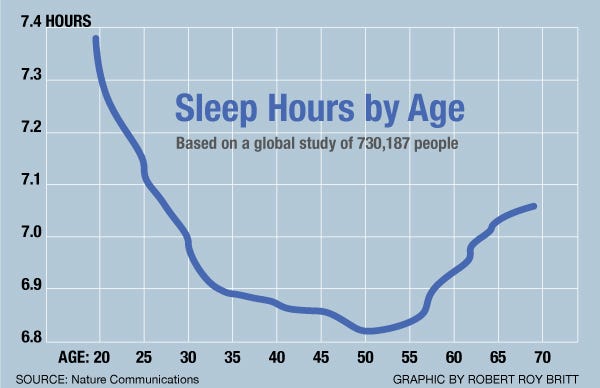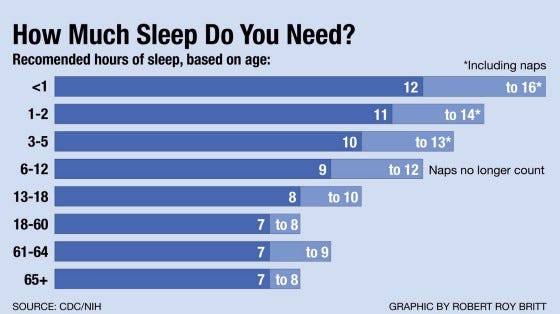Understanding Sleep Patterns in Older Adults: Debunking Myths
Written on
Chapter 1: The Myth of Sleepless Seniors
The misconception that older adults struggle to get enough sleep is widespread. However, I can personally attest that at age 60, my sleep is quite satisfactory, as is the case for many individuals in my age group and beyond. While personal experiences are not scientific evidence, research indicates that insufficient sleep and insomnia can affect anyone, regardless of age.
Recently, a comprehensive study sheds light on this issue, demonstrating that midlife is often the most challenging period for sleep. This study involved over 730,000 participants across 63 countries and revealed that sleep duration tends to decrease from early adulthood, remains low from the mid-30s to mid-50s, and then begins to rise.

According to Dr. Hugo Spiers, a co-leader of the study and director of spatial cognition research at University College London, “Previous studies have found associations between age and sleep duration, but ours is the first large study to identify these three distinct phases across the life course.” He adds that while sleep duration decreases during mid-adulthood, there are notable differences based on regional and national contexts.
This research, published in the journal Nature Communications, utilized unique data from participants in a mobile game called Sea Hero Quest, designed for neuroscience research. The average sleep duration reported was seven hours per night, with women sleeping slightly more than men.
Researchers suggest that the decline in sleep during midlife may stem from responsibilities related to work and childcare. Other factors, such as financial pressures and general life stress, also contribute to sleep challenges during this phase.
Section 1.1: Quality of Sleep Matters
Merely having enough hours of sleep is not the full picture. Quality sleep can be elusive for many, regardless of age, due to health issues, lifestyle choices like excessive alcohol consumption, or rising levels of stress and anxiety.
As we age, the likelihood of developing health conditions that disrupt sleep increases. Additionally, older adults often take medications that can interfere with sleep quality. Thus, falling asleep, staying asleep, and achieving restorative sleep can be difficult for anyone.
A frequently referenced Gallup poll from 2013 found that U.S. adults aged 65 and older reported sleeping more than any other adult age group, with 67% stating they sleep at least seven hours regularly. The data revealed the following percentages for various age groups:
- 18–29: 54%
- 30–49: 56%
- 50–64: 62%
- 65+: 67%
While surveys can be imperfect, they generally suggest that many older individuals enjoy satisfactory sleep. When difficulties arise, they often correlate with identifiable, manageable behaviors or health issues.
Section 1.2: Addressing Sleep Challenges
In my research for a book on improving sleep, I surveyed 103 adults of varying ages. Although not a scientific poll, it revealed interesting trends: seniors scored comparably to younger adults on my Sleep Score questionnaire, which evaluates sleep quality. Those who reported poor sleep identified similar key factors, such as stress, health problems, or disruptive habits—what I refer to as "sleep kryptonite."
Subsection 1.2.1: Sleep Requirements
There is no definitive guideline for the exact number of hours of sleep necessary for each individual. Experts generally recommend at least seven hours for most adults, but genetics and lifestyle factors can influence personal sleep needs. Federal guidelines are somewhat ambiguous for older adults, incorrectly implying that individuals need less sleep upon reaching 19.

However, recent studies indicate that poor-quality sleep can be just as detrimental as insufficient sleep duration. To better understand your sleep quality and discover ways to enhance it, consider the following resources:
Your Sleep Quality Probably Sucks: How to Know and What to Do.
Stressed? Sluggish? Irritable? Exhausted? Unhappy? All signs you may not be getting efficient, quality sleep. Fix the…
Chapter 2: Exploring Sleep in Older Adults
The first video titled "The #ScienceOfSleep and Older Adults Q&A" delves into the scientific aspects of sleep, particularly in older adults, addressing common questions and misconceptions about their sleep patterns.
In the second video, "Reasons Why Seniors Don't Sleep Well at Night | Senior Sleep Problems," experts discuss various factors contributing to sleep issues among seniors and provide insights on how to mitigate these challenges.
Your support enables me to continue writing about health and wellness. To stay updated with my publications on Medium, consider signing up for notifications, or join Medium to directly support my work and access all stories. You can also find my book, "Make Sleep Your Superpower: A Guide to Greater Health, Happiness & Productivity," available in paperback and Kindle formats. — Rob